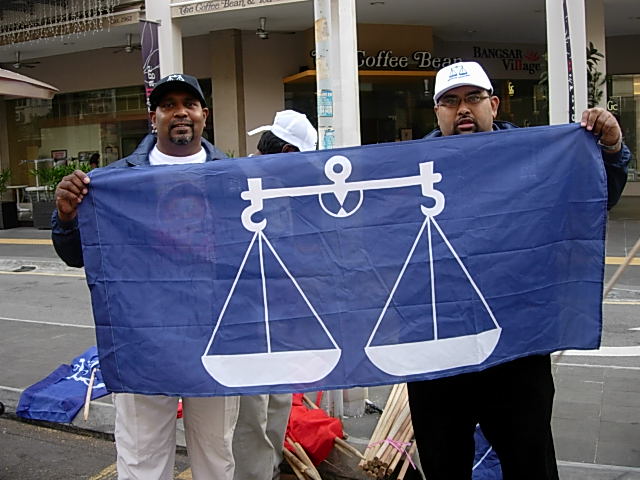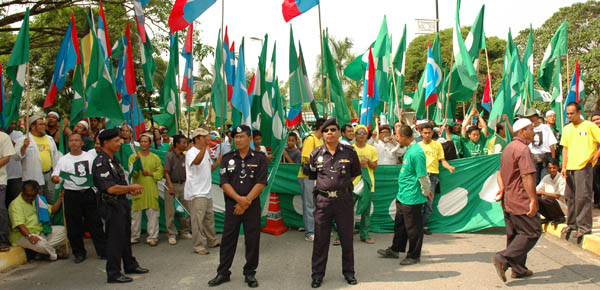Or A Skeptics Guide to the Difficult Choices Before Us
By Sharaad Kuttan
ELECTION season never fails to induce in me a sense of dread. While I wish it a quick end, I am by no means an advocate of the shorter campaign period. Like in so many other things, it’s not the length that matters, it’s the magic in it. And there is little magic this season.
Let me be clear. I am not averse to the rituals of election season: its high drama and low humour, its surprises and predictable conclusions. It is not even the domination of the national consciousness by matters electoral that bothers me. I am conversant enough with the current political talk, limited, as it may be, to a trade in political factoids, rumours, polemics, and wishful thinking. I can hold my own at the coffee shop. I even harbour a joy for political jousts; and hope to be lucky enough to watch some political giant fall flat on his face. But that too has limited appeal.
Still while I have no truck with political spectators and cynics, I’m not altogether enthused by this new election season. Perhaps I am not sure what is at stake that has not already been stewing in the nation’s guts all these years. It seems every election in my lifetime has been a chance for us to turn the corner on an enervating, if soft and fuzzy, authoritarianism. Every election has been a chance to boot out corruption and repression and to usher in greater democracy. In that regard, nothing much has changed; this time I will have to do without the shock of Reformasi to get me out of bed on March 8.
Perhaps the problem lies in the fact that while in the past I equated the Barisan Nasional (BN), solely, with authoritarianism, these days I see its spectre refracted in the words and actions of politicos and parties across the spectrum. And as convinced as I am with the argument that the denial of a two-thirds majority to the BN is a necessary condition for the inauguration of a new politics, I am not altogether certain that the political opposition, as a whole, is adequate to the task.
I whisper a mid-20th century mantra to myself: “pessimism of the intellect, optimism of the will”. It is a favourite. I repeat it three times and look down at my shoes.
 I must confess that I decided many years ago to cast my vote against the BN. In that regard I have solid political convictions. My resolve was shaken only momentarily with the installation of Abdullah’s administration a number of years ago. I was taken in by the talk about the bold, young and progressive minds advising Abdullah. I have since discovered that “the fourth floor” is merely an elevator stop. No need for celebration; it’s business as usual in Putrajaya.
I must confess that I decided many years ago to cast my vote against the BN. In that regard I have solid political convictions. My resolve was shaken only momentarily with the installation of Abdullah’s administration a number of years ago. I was taken in by the talk about the bold, young and progressive minds advising Abdullah. I have since discovered that “the fourth floor” is merely an elevator stop. No need for celebration; it’s business as usual in Putrajaya.
As for the political opposition, my feelings are equally solid. Solidly ambivalent, that is. However, since they are neither a coherent organisation nor a permanent alliance, it is perhaps unfair to judge them as one. Though, in so far as they have chosen to address the voting public as one through their electoral pact, a comparison with the BN is occasioned.
The season began badly enough: the lead up to the general election was hobbled by the spectacle of opposition parties negotiating their electoral pact in order to avoid three-cornered contests. It was curious that these conflicts found an airing in the media. Perhaps this was an attempt to generate confidence amongst party loyalists: that no party was willfully subordinating itself to the other. No hegemony; no ketuanan [supremacy]; nothing resembling Umno’s unashamed dominance of the BN.
Unfortunately, as I have no party loyalties, I observed this spectacle with muted horror, wondering if short-term interests would always be the hallmark of this alternative alliance. But to the credit of the Opposition – now capitalised – most difficulties seemed ironed out by nomination day. This compact however means that differences of political values or programmes within this Opposition front will not be dealt with during the campaign period.
Had these differences been debated during the years since the last election, I ask myself. I can’t honestly say I remember if they were. Perhaps I am being naïve: a pragmatic approach to the challenges of the BN’s decades of dominance would suggest that these questions have to be dealt with at a later stage.
What does the Opposition offer?
I assume the leadership of the Opposition would have us imagine a stage-by-stage movement towards change. Stage one, deny the BN a two-thirds majority. Then after gaining the confidence of the electorate, in part by breaking through this psychological barrier, the next stage would be taking over government. And the last stage would be the struggle, albeit a civil one, within the Opposition front over their differences. Perhaps not.
The party political leadership probably imagines the stages differently than I do. The trouble with people like me is that we are always running ahead of ourselves, fantasising about the pressures of third base when we haven’t even gotten to the pleasures of first base.
Thankfully PAS provides us with an example of an opposition party that has taken control of a state. Here rhetoric can be matched with really existing performance. (With the others, one can only look to how they handle internal party matters to judge how they might perform in the event that they take control of government.) So what has the “liberated” Kelantan to show to the rest of the country?
While the BN often accuses the PAS government of having failed to bring economic development to the state, it’s an unjust accusation to say the least. It is the BN government that has denied the Kelantanese of development, by politicising development, making it a reward for political loyalty and refusing to acknowledge that it is a right regardless of the population’s political persuasion.
Yet, in spite of the limits imposed by the BN-controlled federal government, what have been the contributions of the PAS government to the vision of a democratic
Dear Bung Nik,
Men and women (and of course men and men, and women and women) can, do and will cavort in the aisles!
Dengan ikhlas [Yours sincerely],
————
 The singular failure of the PAS government to do the little it could to be considered a beacon in a swamp of authoritarian rule dampens my enthusiasm somewhat. The one saving grace is that they, for reasons demographic and historical, don’t stand in my constituency. If they did, I would be faced with a painful conflict of principles (limited as they are): anti-BN, pro-anti-authoritarian, anti-silly, cautiously stagiest, pragmatic. If I was unfortunate enough to have to make a choice, I might be tempted to stay in bed on the 8th.
The singular failure of the PAS government to do the little it could to be considered a beacon in a swamp of authoritarian rule dampens my enthusiasm somewhat. The one saving grace is that they, for reasons demographic and historical, don’t stand in my constituency. If they did, I would be faced with a painful conflict of principles (limited as they are): anti-BN, pro-anti-authoritarian, anti-silly, cautiously stagiest, pragmatic. If I was unfortunate enough to have to make a choice, I might be tempted to stay in bed on the 8th.
Did the DAP do much better after the solid wins in the state assembly in
In the last few years, I did manage to insinuate myself into a dialogue session organised by Parti Keadilan Rakyat. In that instance it was the participants – non-governmental organisation activists primarily – who failed to deliver. Instead of dialogue, party representatives were variously hectored or petitioned. It was a salutary reminder that the culture and practices of political parties are deeply embedded in the values of their constituents. Does that give me hope? Hope is too strong a word for me, but it does suggest that we non-party political types can play a role in shaping the politics that surround us.
Lastly, the skeptic in me needs to come to terms with post-Reformasi
Wanted: an imaginative opposition